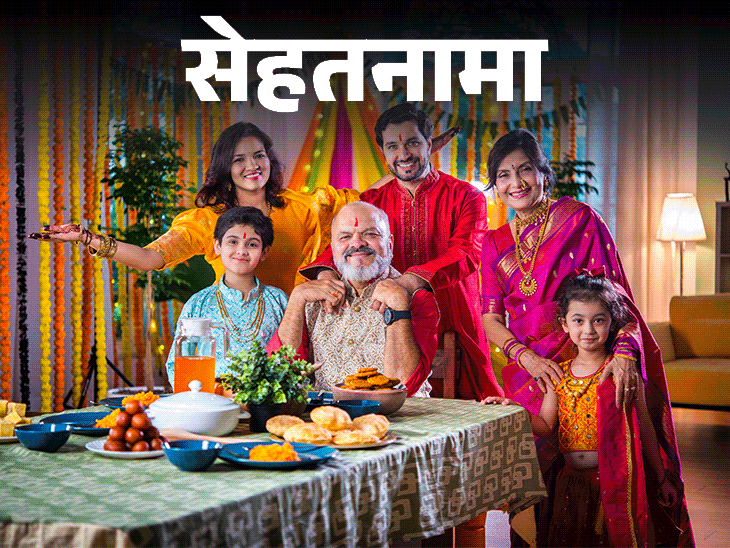Diwali It’s the festival of lights. It is a celebration of happiness and harmony. Today in India every happiness is celebrated by eating sweets and dishes. In such a situation, the quantity of these sweets increases slightly during the country’s biggest festival, Diwali.
People who have been eating balanced foods for many months to stay healthy face the greatest difficulty. He sacrificed taste for a healthy weight, but on this day, all his hard work is in vain.
Even worse is the condition of those who eat sweets and meals but feel guilty thinking about the calories. First, you’re consuming a lot of calories, plus you’re also blaming yourself, and then the combination of the two can be even more harmful. It is not right to control the mind so much on this festive occasion, otherwise one will feel guilty for not being able to taste anything. Therefore, it would be better to have a balanced and balanced diet this Diwali.
Today in ‘Sehatnama’ we will know how our food should be during Diwali. You will also learn that-
What to do if you have to eat a dish? How to plan food? How to take care of your gut health during the festival?
Planning has great power. All the great wars in the world are won by great planning. There is a lot of planning behind all the successful scientific tests in the world. There is a lengthy planning process to determine when, how and where any missile or spacecraft intended for launch to the Moon or Mars will be launched.
Very small tasks often fail because we don’t do any planning or preparation. Therefore, it is important that we plan a little about what, when, how and how much we will eat during Diwali. Before that, see in the graph, 10 important tips from the nutritionist.
Plan Diwali breakfast like this: We enjoy the aroma and taste of Chivda, Laddus and many homemade sweets during Diwali since our childhood. There is no harm if protein-rich foods are also added to this breakfast.
Delhi-based senior nutritionist Dr Anu Aggarwal says you can eat chivda mixed with moong dal chilla or paneer bhurji. If you want, you can eat delicious laddus with a glass of milk. Almonds, walnuts or your favorite nuts can be added to these laddus.
Eat snacks between breakfast and lunch. The problem of eating meals or sweets arises when we consume too much in one sitting. Dr. Anu Aggarwal says this happens when we are very hungry.
To avoid this, plan frequent meals. Like you could eat something between breakfast and lunch. This will keep you from being too hungry until lunchtime. During this period, you can eat any fruit as a snack. It can be an apple, a banana, a pomegranate, anything.
Plan lunch and dinner smartly: Usually during Diwali, lunch or dinner is done with family and friends. Some of the dishes served here contain very high calories. In such a situation, you can start the meal with salad. After that, eat something rich in protein like dal or cheese with roti or rice. Remember to take curd or buttermilk with food. It is a good source of probiotics. With its help it will be easier to digest food.
Take care of your hydration
During Diwali, people often stay up late at night and party. Staying up late at night and eating too many sugary or fatty foods can cause dehydration. This can cause acidity problems and headaches. So make sure that during this time you have a water bottle with you and continue to drink water throughout the day. Drink at least 8 to 10 glasses of water throughout the day.
Take care of your gut health: Our daily routine often changes completely during Diwali celebrations. Additionally, during this time we eat foods that are not usually part of our plate. It contains so much flour, sugar and fat that it can harm gut health.
The solution to this problem lies in foods rich in fiber. Include as many salads and fruits as possible in your diet. Drink 1 glass of buttermilk with or between meals. Start your day with a glass of lemon water or amla water. This will not cause acidity and will also aid digestion.
Prepare sweets and dishes at home A few days before Diwali, news about adulterated sweets and khoya starts appearing in the newspapers. There are several reasons for this:
In the month of October-November, the milk production of animals decreases. Livestock farming reduces the sale of milk to make sweets at home. The demand for milk for making sweets is increasing in the market. many bend.
Therefore, when there is no supply, confectioners begin to adulterate. To increase the amount of sweets and reduce the cost, a lot of sugar is also added.
This can be extremely harmful to our health. So it is better that you prepare treats and meals at home.
Prepare healthy foods like this. We all know that no matter how much we restrain ourselves during Diwali, some foods end up being superfluous. Therefore, we can already add such adulteration to our diet, which will make it healthier.
We can mix barley and millet flour with wheat flour at home. Every time you drink water, try adding lemon to it. Give the same water to others to drink. This will maintain the supply of minerals as well as water and gut health will also improve.
Let’s see in the graph what changes we can make:
………………………….. Health Nama – Firecrackers are dangerous for the lungs: Smoke And the risk of serious illnesses from chemicals
Smoke from firecrackers increases the risk of respiratory diseases. It can also cause many infectious diseases. The condition of an already ill person may worsen. …

